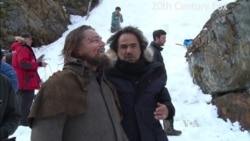It’s no surprise that one of the main winners of Oscar night was Leonardo DiCaprio, who took home the award for Best Actor in a Leading Role.
However, his visceral performance as Hugh Glass, a critically injured 1820s frontiersman fighting for survival in the American wilderness is integral to Oscar winning director Alejandro Inarritu’s film "The Revenant", and the grand cinematography by Oscar winner Emmanuel Lubezki.
Based on a true story, Inarritu’s cinematic epic adventure is set in the unchartered 19th century American Frontier. Through Hugh Glass’s harrowing journey of survival and revenge, the Oscar winning filmmaker immerses audiences in a beautiful but harsh landscape of 19th century America.
During a fur trapping expedition, Hugh Glass and his team are attacked by Indians. Only a few escape.
With their fur hides left behind, tempers flare. John Fitzgerald, Glass’s prejudiced and opportunistic partner grows hostile towards Glass and especially against Glass’s half Indian teenage son, Hawk, as Glass suggests the trappers take a different route to avoid the Indians. The plan, unfortunately could cost them their fur bounty.
WATCH: "The Revenant" trailer
Left for dead
As tensions grow, Glass is attacked by a bear and left barely alive. Unwilling to stay with Glass, in the wilderness, and delay his trading expedition, Fitzgerald attempts to finish Glass off. When Hawk catches him in the act, Fitzgerald kills him and buries Hugh Glass alive. But Glass claws himself out of an early grave. Having witnessed Fitzgerald kill his son, he vows to find him and kill him.
What follows is an epic trek of endurance in the American wilderness.
Throughout the film, Leonardo DiCaprio delivers very few words. His character is so heavily wounded he cannot utter many words and later when he starts recovering he is alone in the wilderness. His visions and hallucinations are the only window to his feelings and memories of his love for his dead son and Indian wife.
With his signature long and fluid takes, filmmaker Alejandro Inarritu composes an epic tale set against a beautiful but stark backdrop where frigid cold, lack of food and constant attacks by hostile Indians threaten Glass but also add to his resolve to endure.
“Because there [are] very few words he delivers, he has to make you feel cold, sadness, rage, and many complex emotions simultaneously with his body language and only his eyes. That is a very difficult task," director Inarritu said, describing DiCaprio’s tour de force performance.
Filmmaker's vision
Leonardo DiCaprio’s says his Oscar winning interpretation would not have been possible without Inarritu’s filmmaking vision which takes us into the beautiful West but also into the dreamscape of Glass’s subconscious mind.
“More than anything what Alejandro wanted to do was to create poetry in that story; what it means to have all the chips stacked against you and this triumph of the human spirit,” DiCaprio said.
"The Revenant" becomes a spiritual journey and what appears as unscripted imagery, Inarritu reveals, was a series of well-rehearsed and choreographed sequences in subzero temperatures in the Canadian Rockies.
“We traveled long hours to get there, long time for wardrobe and makeup. By 3:00 p.m there was no (day) light. So we had windows of one hour and a half to shoot very complex scenes with hundreds of extras and very intimate emotions,” DiCaprio explained.
Inarritu’s vision was brought to life by Emmanuel Lubezki’s Oscar winning cinematography. Lubezki filmed in natural light only. Iñárritu says he worked with sunlight and fire light only, in an attempt to recreate a 19th century palette of colors. The filmmaker says he envisioned the look of "The Revenant" as a chiaroscuro painting, full of light and shade so there was not space for the artificial lighting of the 20th and 21st centuries.
“Alejandro wanted the movie to be incredibly immersive, to be plunged into the world of Glass," cinematographer Emmanuel Lubezki said.
Departure from tradition
"The Revenant" departs from the traditional western of two dimensional portrayals in the relationship between whites and Indians.
In "The Revenant", Native American dialects are spoken and the Indian characters are interpreted by Native American actors.
"The Revenant" savors life in a world where death is just seconds away.







